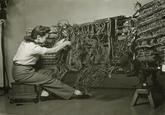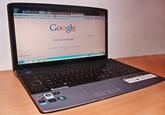Computer
This entry has been rejected due to incompleteness or lack of notability.
To dispute this DEADPOOL flagging, please provide suggestions for how this entry can be improved, or request editorship to help maintain this entry.
A computer is a programmable machine designed to sequentially and automatically carry out a sequence of arithmetic or logical operations. The particular sequence of operations can be changed readily, allowing the computer to solve more than one kind of problem.
Conventionally a computer consists of some form of memory for data storage, at least one element that carries out arithmetic and logic operations, and a sequencing and control element that can change the order of operations based on the information that is stored. Peripheral devices allow information to be entered from an external source, and allow the results of operations to be sent out.
A computer's processing unit executes series of instructions that make it read, manipulate and then store data. Conditional instructions change the sequence of instructions as a function of the current state of the machine or its environment.
The first electronic computers were developed in the mid-20th century (1940–1945). Originally, they were the size of a large room, consuming as much power as several hundred modern personal computers (PCs).
Modern computers based on integrated circuits are millions to billions of times more capable than the early machines, and occupy a fraction of the space. Simple computers are small enough to fit into mobile devices, and mobile computers can be powered by small batteries. Personal computers in their various forms are icons of the Information Age and are what most people think of as "computers". However, the embedded computers found in many devices from mp3 players to fighter aircraft and from toys to industrial robots are the most numerous.
History of computing
---
The first use of the word "computer" was recorded in 1613, referring to a person who carried out calculations, or computations, and the word continued with the same meaning until the middle of the 20th century. From the end of the 19th century onwards, the word began to take on its more familiar meaning, describing a machine that carries out computations.
Limited-function early computers
The Jacquard loom, on display at the Museum of Science and Industry in Manchester, England, was one of the first programmable devices.
The history of the modern computer begins with two separate technologies--automated calculation and programmability--but no single device can be identified as the earliest computer, partly because of the inconsistent application of that term. A few devices are worth mentioning though, like some mechanical aids to computing, which were very successful and survived for centuries until the advent of the electronic calculator, like the Sumerian abacus, designed around 2500 BC which descendant won a speed competition against a modern desk calculating machine in Japan in 1946, the slide rules, invented in the 1620s, which were carried on five Apollo space missions, including to the moon and arguably the astrolabe and the Antikythera mechanism, an ancient astronomical computer built by the Greeks around 80 BC. The Greek mathematician Hero of Alexandria (c. 10–70 AD) built a mechanical theater which performed a play lasting 10 minutes and was operated by a complex system of ropes and drums that might be considered to be a means of deciding which parts of the mechanism performed which actions and when. This is the essence of programmability.
Around the end of the tenth century, the French monk Gerbert d'Aurillac brought back from Spain the drawings of a machine invented by the Moors that answered Yes or No to the questions it was asked (binary arithmetic). Again in the thirteenth century, the monks Albertus Magnus and Roger Bacon built talking androids without any further development (Albertus Magnus complained that he had wasted forty years of his life when Thomas Aquinas, terrified by his machine, destroyed it).
In 1642, the Renaissance saw the invention of the mechanical calculator, a device that could perform all four arithmetic operations without relying on human intelligence. The mechanical calculator was at the root of the development of computers in two separate ways ; initially, it is in trying to develop more powerful and more flexible calculators that the computer was first theorized by Charles Babbage and then developed, leading to the development of mainframe computers in the 1960s, but also the microprocessor, which started the personal computer revolution, and which is now at the heart of all computer systems regardless of size or purpose, was invented serendipitously by Intel during the development of an electronic calculator, a direct descendant to the mechanical calculator.
--
Major Uses
--
Computers make memes







Display Comments